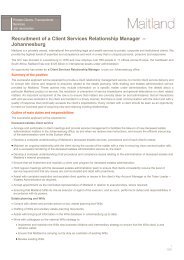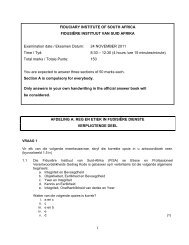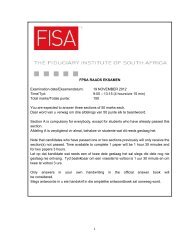Ngwenyama v Mayelane wedding after customary wedding
Ngwenyama v Mayelane wedding after customary wedding
Ngwenyama v Mayelane wedding after customary wedding
Create successful ePaper yourself
Turn your PDF publications into a flip-book with our unique Google optimized e-Paper software.
7<br />
wife, it is for that reason that she must be joined in the proceedings<br />
determining the proposed contract regulating the ma trimonial property. I deal<br />
with this issue in my conclusion.<br />
Discussion<br />
[12] The stated purpose of the Act is:<br />
‘To make provisions for the recognition of customar y marriages; to specify the<br />
requirements for a valid <strong>customary</strong> marriage; to reg ulate the registration of<br />
<strong>customary</strong> marriages; to provide for the equal statu s and capacity of spouses in<br />
<strong>customary</strong> marriages; to regulate the proprietary co nsequences of <strong>customary</strong><br />
marriages and the capacity of spouses of such marri ages.’<br />
In short, the Act marks a significant break from th e past when <strong>customary</strong>,<br />
and more particularly polygamous marriages were con sidered repugnant to<br />
public policy. In so doing it seeks to protect and advance the rights of women<br />
married in accordance with <strong>customary</strong> law and tradit ion. To this end, the<br />
Constitutional Court in Gumede v President of the Republic of South Africa 6<br />
restated the purpose of the Act as follows:<br />
‘The Recognition Act is inspired by the dignity and equality rights that the<br />
Constitution entrenches and the normative value sys tems it establishes. It is also<br />
necessitated by our country’s international treaty obligations, which require member<br />
states to do away with all laws and practices that discriminate against women …’<br />
What is clear is that s 7(6) is intended to protect matrimonial property rights<br />
of the spouses by ensuring a fair distribution of t he matrimonial property in<br />
circumstances where a husband is desirous of enteri ng into a further<br />
<strong>customary</strong> marriage.<br />
[13] I have indicated earlier in this judgment tha t the court below based its<br />
finding that the second marriage was null and void on the peremptory<br />
language of s 7(6). The section states in plain lan guage that a husband<br />
6 Gumede v President of the Republic of South Africa fn 3 supra para 21.



![Motsepe v Khoza customary marriage and child[3]](https://img.yumpu.com/44777240/1/184x260/motsepe-v-khoza-customary-marriage-and-child3.jpg?quality=85)


